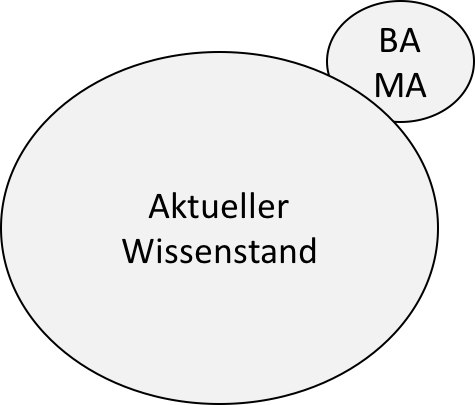The time has come: you want to finish your studies and find a topic for your bachelor’s or master’s thesis. Lately I have been receiving more and more inquiries from students who are looking for a topic for a master’s or bachelor’s thesis. Therefore, in this article I would like to give some recommendations for economic science and business informatics students.
Tip: Download my step-by-step guide to finding a topic.
The difference between academia and practice
Often you think: “Topic XX is exciting – that’s what I want to do”. But in practice and at the academy there is a major difference. For a practical article, people like to look for a topic that is exciting and write about it. You summarize current information and then add your own opinion in a well-dosed manner. The article should be easy to read, practical and include a guideline.

In the academy, however, it is different: The aim here is to summarize the current knowledge and to build on it! The aim is to observe and question. For this reason, it does not make sense to brainstorm yourself, but only roughly look for a topic that you find exciting and build on the current state of knowledge.
On the shoulders of giants! ( Google Scholar )
It is important to build on other researchers and to have an ongoing dialogue. You have to imagine it this way: On the subject of agility, there is a beer table at which several authors have been sitting and have been debating about it for years. Every now and then someone stands up and now and then someone sits down. Now sit down and what do you do? First you listen to the discussion and summarize it (literature analysis). Then you say something about this yourself (research).
An example: We have been talking about leadership for many years. Here, too, there is an ongoing dialogue. First there was research on tribal leaders and the mafia, then on leadership in industry, then research on what leadership in knowledge work and agile leadership can look like. And now let’s talk about digital leadership and leading virtual teams. So it always went on somehow in an ongoing dialogue.
Find a topic for a bachelor’s and master’s thesis – how do I proceed?
Now the question arises: “How should I then find a topic for my bachelor thesis or master thesis?” In the following I explain the procedure that is fundamentally recommended for the topic search. It’s actually a pretty straightforward process. If you are writing a paper together with a company, you will find a few additional tips for practical work at the end of the article.

Finding literature – what is academic?
The supervisor must have told you to use academic literature. But what is academic? Of the VHB-JOURQUAL3 is a ranking of economically relevant journals based on the judgments of the VHB members. The VHB4 should also come soon.
Over 1,100 members of the VHB have made a total of 64,113 reviews of magazines in the last few months. Of the 934 journals that were up for review, 651 journals exceeded the threshold of 25 reviews and received a rating.
Reading tip: literature analysis
Everything you will find in these journals is academic and can be used. These are divided into A, B, C, D. Basically, the closer to A, the better, but a good D-Journal can also bring added value! D journals often describe themselves as the interface between academia and practice. So here academics write for practitioners. At C-Level, on the other hand, academics write for academics. Usually these are not known internationally, but rather nationally. B journals are international and always in English – A, on the other hand, are the actual top journals in a particular area. There are also various A + journals. A contribution for such an A-Journal often takes 3 years. So it takes a lot of work. The distribution is as follows:
- 22 outstanding and globally leading scientific journals in the field of business administration (A + = 3.4%),
- 72 leading academic business journals (A = 11.1%),
- 217 important and respected scientific business journals (B = 33.3%),
- 273 recognized academic business journals (C = 41.9%) and
- 59 scientific business journals (D = 9.1%).
Scientific databases
The academic literature is distributed in various databases. As a rule, only literature from the journal or high-quality research is permitted in these databases. A search string is searched here, which is composed of keywords. For example, enter “digi * AND (workplace OR” knowledge work “) AND (mobil * OR individu * OR agil *)” in Emerald to search for a digital workplace or “tak (digi *) AND tak (workplace OR “knowledge work”) AND tak (mobil * OR individu * OR agil *) “. The well-known databases include:
- EBSCO (ASC, BSC, EconLIT)
- ScienceDirect
- Emerald
- Web of Science
- ACM
- AISel
- EconBiz
- IEEE
- ProQuest
- Springer link
The mother paper
Now search with a search string and look at the results. You will end up with 3-5 very good papers. I like to call you Mother paper (got the concept of Miss Dr. Carolin Durst learned in a seminar and I liked it very much). These are papers that do exactly what you want to do. I have 5 for my doctoral thesis, which I quote over and over again. So you should search until you have also found this mother paper for yourself. These have the following properties:
- You find the papers exciting!
- They relate exactly to your topic!
- You do about what you want to do too!
It is important to keep in mind that the academy is an ongoing dialogue. With the topic search, you have now created your own beer table. In your literature analysis, these 3-5 authors of the mother paper are now sitting at a beer table and showing the readers what they have to say on the topic. In your subsequent research part, you make your personal, further contribution to this.
Tip: Download my step-by-step guide to finding a topic.
Find research question
Now is the mission Find research question quite easy. A meaningful research question needs to be formed from the mother papers, one’s own interests and the will of the supervisor. I have a nice one about that Overview at Bachelorprint found. This is based on Kornmeier’s book. You can use a number of question types to devise what you want to do thematically. Description, explanation, forecast, design, criticism – I have adapted Kornmeier’s illustration to our current topic: agility and digitization.
Reading tip: Book by Kornmeier
Adapted table from Bachelor print
| Question type | Task and central question (s) | Examples of the research question |
| Description / description | Describe a state: What is the case? What does the “reality” look like? (Or also: Does reality really look like this?) (Karmasin & Ribing 2014: 25) | How is digitization currently taking place in medium-sized companies? How and in what contexts do managers use Holacracy? |
| Reason/ Explanation | Understand / explain a connection: Why is something like that? Which causes lead to which effects? (Samac, Prenner & Schwetz 2009: 49) | Why do companies differ in their personnel development intensity? Why has agility in SMEs changed since 2015? |
| layout | Measures to achieve a goal / solving practical problems: Which measures are suitable to achieve a specific goal? (Karmasin & Ribing 2014: 25) | How can the employment rate be ensured in the future with increasing automation? What measures / strategies should large companies take to introduce basic income? |
| forecast | Outline future events and their consequences: What will something look like in the future? What changes will happen? (Bänsch & Alewell 2013: 4) | How will the agility of companies in an industry change? How will digitization change in SMEs in the next five years? |
| Criticism/ Evaluation / rating | Practice criticism of something, make suggestions for improvement: How is a certain condition to be assessed against the background of the explicitly named criteria? (Samac, Prenner & Schwetz 2009: 49) | How should digitization in SMEs be assessed with regard to the promotion of formal performance dimensions? How has the introduction of virtual and agile teams affected the job satisfaction of employees? |
| Utopia | Speculation, sense / ethics from a scientific point of view related to long-term predictions or developments: What will the world of tomorrow look like? (Kornmeier 2013: 61) | What will professions look like after the digital transformation? What role does work play in an increasingly automated society? Will only a small elite be able to work? |
Title of a master’s or bachelor’s thesis
The title of a work is now quite easy to determine. It consists of two parts: What do I & how do I do it. Thus, the first part has the actual topic, e.g. agility in SMEs or automation of workplaces. The second part then describes the procedure: e.g. the investigation of a selected company, case study of SMEs, expert interviews and empirical evaluation, survey of selected SMEs, etc. – here are some examples:
- Agility in SMEs – survey of selected companies
- Digitization of knowledge work – expert interviews and empirical evaluation
- Basic income in Germany – a case study
Tip: You can find an example of a literature analysis with many suggested topics for a thesis in my study from 2019 (online from March 2019).
Lindner, D., & Christian Leyh. (2019). Digitization of SMEs – questions, recommendations for action and implications for IT organization and IT service management. HMD – Praxis der Wirtschaftsinformatik , 4th , 21.
Alternative: observe practical phenomena with theory
Many of you are also writing a paper in collaboration with a company. I also have my master’s thesis agile in the Waterfallworld written with a company. Here the topic should often be very practical and a problem for the company, but at the same time also very academic. The solution of a company-specific problem such as the introduction of a SAP in a medium-sized SME, however, is not a sufficient bachelor thesis in a strictly academic sense.
In theory, this dilemma is easy to solve by taking a practical company problem like mine: agile and waterfall methods in a company. You investigate this practical problem with a theory such as game theory, agility, Porter’s Five Forces or similar. So you are investigating a problem in the company using a scientific theory. This forms the perfect bridge between theory and practice. You have to look for yourself and individually to see which theory can fit here. The following is a list of known theories that make sense in the course of our topic:
- Systems theory
- Taylorism / Scientific Management (Taylor)
- Theory X and Y (McGregor)
- Organizational life cycle models
- Organizational Development (Lewin)
- Evolutionary Management (St. Gallen)
- Incentive contribution theory (Simon / March / Banard)
- Further theories at the Management Academy
In practice, however, you can often expect that a long consultation will be necessary and that you can plan a good 10-12 instead of 6 months. But it is worthwhile, as you are often employed directly afterwards and get good money during your master’s thesis. In addition to the starting salary, my time as a junior consultant has also been significantly shortened.
In the following I give a few examples and tips for finding a topic. In addition, I list a number of practical problems and give a suitable theory or an academic perspective. It is now your job to coordinate this with the supervisor and with the company.
Adapted table from Bachelor print
| Practical problem | Academic theory or point of view |
| Introduction of flexible work / mobile work | Implications on IT, influence on people / stress or efficiency in the workplace through technology, prognosis of the digitization of work |
| Introduction of Holacracy | Change model from Kotter, factors influencing the success of organizational models, evaluation of Holacracy upon implementation, how will Holacracy change the team? |
| Digitization of a process through tool introduction | Effects of software support on work performance, success factors of process digitization, difference between digitization of processes and classic process management |
Summary
In this article I have compiled my current knowledge about finding a topic. Of course there are other options and in the end the supervisor decides on the process and the relevance of the topic and, if necessary, the practice partner. I have only given a few suggestions here, which I believe are quite useful for a thesis. For further information, please have a look at my book suggestions!
Tip: Download my step-by-step guide to finding a topic.
Reading tip: Book suggestions for theses
Call for theses
Call for Articles : If you have a exciting thesis you are welcome to write one Summary write about them (about 1000 words or more) and I publish them on my blog. This can be useful both for an application and for your own reputation. Simply send an email to abschlussarbeit@agile-unternehmen.de.
Reading tip: Publish a master’s or bachelor’s thesis
[student] Verwendete Quellen anzeigen
Kornmeier, Martin. 2013. Scientific writing made easy – for Bachelor, Master and dissertation . 6th ed. Bern: Main.



